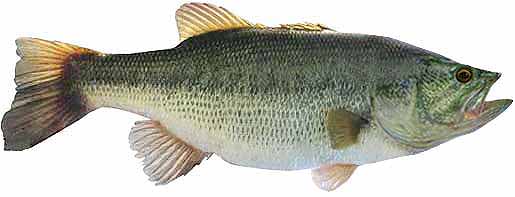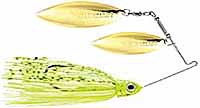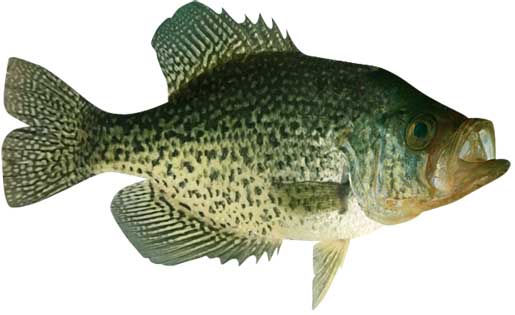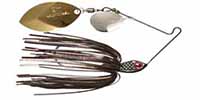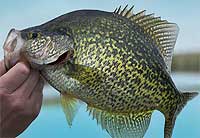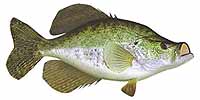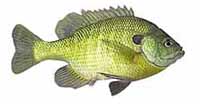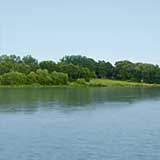Fishing Report For Lake Wanahoo, NE
By Rick Seaman
Last updated on .
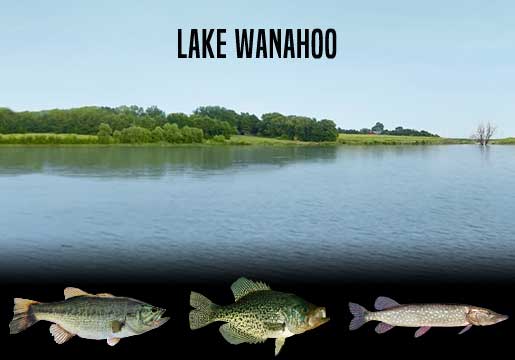
Fishing Reports
Popular Fish Species Lake Wanahoo, NE
Fishing Report: Largemouth Bass
Current Fishing Report: Good To Very Good
Bass fishing is currently experiencing major changes in the way anglers are approaching the sport. The expanded use of high-tech fish finders is giving anglers, who fish from a boat, a distinct advantage. The fishing hasn't really changed, but the catch rate has increased considerably. The advent of new lures and equipment has improved success for anglers fishing from the bank as well. Savvy anglers, who study bass patterns, continue to catch nice fish, with or without the new gadgets.
FALL. Now that Fall has arrived, bass here are moving shallow and following schools of baitfish into shallow areas with cover, into 5 to 15 feet of water. Currently topwater, jerkbaits, crankbaits, and slow-rolled spinnerbaits are catching fish, as are worms and jigs. Later in Fall, as deeper water cools, bait and bass move out to ledges where flutter spoons and jigs are often good choices.
WINTER. Winter will isolate them around slightly deeper structure and cover. They can be found from 15 to 22 feet deep. Here they hold, feeding less frequently, awaiting warmer water to return in Spring.
SPRING. Once water temperatures rise into the low 60's, largemouth will move from deeper water, into shallower water nearby spawning areas. Vibrating jigs, jerkbaits and spinnerbaits typically get bites away from the shoreline. At this time they are feeding aggressively and preparing for the spawn. Once water warms into the mid to high 60's, they will move into 2 to 6 feet of water, and create nests, then lay their eggs. Immediately afterwards, females move to deeper water and males remain to guard the eggs, and then the fry. After a couple weeks, the males also move to slightly deeper water. Crankbaits, vibrating jigs, plastic worms and swimbaits are catching bass during this period.
SUMMER. Water temperatures will warm considerably in Summer. Bass will feed shallow, early and late in the day, where they will be caught on topwater, crankbaits and swimbaits. Wacky-rigged stick worms always catch finicky bass when the bite is slow, especially around standing timber. Largemouth bass here feed on gizzard shad, small sunfish and crawfish. During the hotter parts of the day, they are typically caught along the edges of depth changes, 10 to 20 feet deep.
Fishing Report: Black Crappie
Current Fishing Report: Good
Black crappie are being caught using new technologies, reducing the amount of time it takes to locate schools. Forward-facing sonar is allowing anglers, fishing from a boat, to locate schools and focus fishing time on areas with good numbers of crappie. Anglers fishing from the bank still have to search via test casting, until a school is located. Then, they are catching them as anglers have for many decades, before the new electronics became available.
FALL. Baitfish, which are moving into shallow flats, coves and bays, are drawing crappie into these areas. They are feeding heavily in preparation for the cold Winter. Minnows, hair jigs, and crappie jigs, are good options during this feeding marathon. Late fall starts the migration deeper, toward winter holding areas, for both crappie and baitfish. Small flutter spoons are a good option during this transition
WINTER. Once the shallows start cooling rapidly, crappie will migrate to deeper holding areas, mostly off shore. At this time they are typically caught using a very slow presentation, in 15 to 20 feet of water. They will continue to bite but may require a very slow presentation.
SPRING. In early Spring, crappie begin staging in 5 to 8 feet of water, just outside spawning bays and shallow flats. Spring is prime time to be on the water, as crappie have moved shallow to spawn. At that time, they are typically caught in 2 to 4 feet of water. Vegetation, docks, brush and wood are where most anglers catch crappie using small crappie jigs or live minnows. After the spawn, crappie typically move outside the spawning area and hold on cover close by. Once they move even deeper, anglers report success using fish finders and forward facing sonar to locate schools of crappie, which tend to stack vertically around cover. Light tackle, with 4 lb to 8 lb line, is a popular choice.
SUMMER. Water temperatures warm, and crappie fishing is usually pretty good. Now that the spawn is over, and the hot Summer sun is warming the shallows, crappie have retreated to depths of 12 to 18 feet, or embedded in the shade of heavy vegetation. This is a good time to focus around standing timber and stumps. Anglers are also locating schools of crappie hanging over deep structure and depth-change edges.
Fishing Report: Northern Pike
Current Fishing Report: Good To Very Good
FALL. As the weather is turning cold, water temperatures are cooling quickly in the shallows. This brings baitfish and sunfish into shallower waters, and northerns follow this food source. They hang around weedbed edges, main-lake points, reefs, and rocky shorelines to ambush prey. This is a prime feeding time as they prepare for winter, and they can be found from 5 to 20 feet deep, depending on cover and baitfish. This is also a good time to catch a trophy pike.
WINTER. Pike remain semi active in Winter, often congregating in or near remaining weedbeds, especially along the edges. Other structure options include long points, reefs, ledge drop-offs, and rocky humps, ideally nearby deeper water. Ice fishing was decent here in winter. At times, when oxygen is depleted in deeper water, northerns suspend directly under the ice, where maximum oxygen is available. Other times they hold on structure in 15 to 20 feet of water, occasionally deeper.
SPRING. After ice out, northern pike migrate to shallow, warmer pockets, bays and coves. Once water temperatures reach around 40 degrees, they move into even shallower areas with vegetation, to spawn. After spawning they linger in the shallow bays for a short period. Once water temperatures rise into the 50's, they move to deeper weedbeds and shallow structures adjacent to even deeper water. Bright colors, whites and flashy lures appeal to these predators. Noisy topwater lures can also produce some spectacular strikes. Alternate between baits until you identify which one triggers the most bites for the day.
SUMMER. Northern pike scatter all around the lake, rather than gather in groups. This makes them difficult to locate. During the day they are holding from 10 to 20 feet deep, on ledges, reefs, weedbeds, rock piles, islands and channel edges. Some of the larger specimens are suspending in open water, just outside feeding areas. Trolling or drift fishing produces some nice catches, using spoons, big spinners, cut bait, and deep diving crankbaits. Early and late in the day, they move shallow to feed and can be caught around most weedy shorelines. Noisy topwater lures, spinnerbaits and Johnson spoons with curly-tail grubs, are catching nice pike shallow.
Lake & Fishing Video
Fishing tips for boat or bank fishing
Fish species to fish for...
Guide to fishing for largemouth bass, blue catfish, black crappie, white crappie, walleye, bluegill and northern pike at Lake Wanahoo in Nebraska.
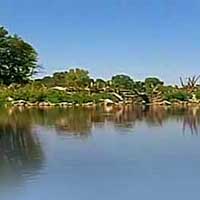
Lake Wanahoo is a 700-acre lake with about 4 miles of shoreline. It is home to bass, crappie, northern pike, walleye, catfish and sunfish.The vast majority of the shoreline is accessible via roads and the Lake Wanahoo Loop trail. Ice fishing is popular in Winter.
Primary fish species to catch
Click images for fishing tips and details about each species.
Today's Weather & Forecast
Fishing License
Click here for a Nebraska Fishing License.
Map - Fishing & Access
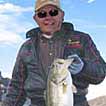
Rick Seaman is a fishing enthusiast with over five decades of fishing experience, a retired tournament fisherman, author of numerous published articles on fishing, and co-author of the book "Bass Fishing - It's not WHAT you throw, It's WHERE you throw it".
Contact Information
Lake Wanahoo State Recreation
Wahoo, NE 68066
402 471-0641
Fishing lakes in each state
010826
NEBRASKA


Walleye, catfish, bass, sunfish and northern pike fishing in eastern NE.


